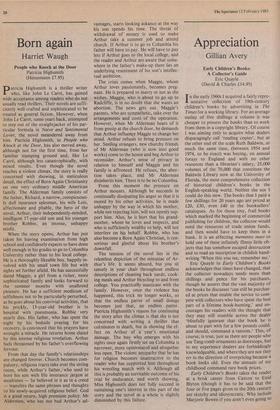Born again
Harriet Waugh
People who Knock at the Door Patricia Highsmith (Heinemann £7.95)
Patricia Highsmith is a thriller writer who, like John Le Carre, has gained wide acceptance among readers who do not usually read thrillers. Their novels are suffi- ciently well-crafted and sophisticated to be treated as general fiction. However, when John Le Carre, some years back, attempted to step out of the straightjacket of his par- ticular formula in Naive and Sentimental Lover, the novel meandered away from him. Patricia Highsmith, in People who Knock at the Door, has also moved away, although not for the first time, from her familiar stamping ground and, like Le Carre, although less catastrophically, with mixed results. Even though the novel reaches a violent climax, the story is really concerned with showing, in meticulous detail, the effect of Born Again Christianity on one very ordinary middle American family. The Alderman family consists of the father, Richard, a narrow, conspicuous- ly dull insurance salesman, his wife Lois, affectionate and pliable, the hero of the novel, Arthur, their independently-minded, intelligent 17-year-old son and his younger brother Robbie, an intense, unhappy misfit.
When the story opens, Arthur has just taken his leaving examination from high school and confidently expects to have done well enough in his grades to go to Columbia University rather than to his local college. He is a thoroughly likeable boy, happily in- volved with his small town life but with sights set further afield. He has successfully dated Maggie, a girl from a richer, more sophisticated family and looks forward to the summer months with unalloyed pleasure. He has a sufficient modicum of selfishness not to be particularly perturbed, as he goes about his convivial activities, that his prickly, 13-year-old brother is in hospital with pneumonia. Robbie very nearly dies. His father, who has spent the night by his bedside praying for his recovery, is convinced that his prayers have wrought a miracle. He returns home elated by this intense religious revelation. Arthur feels threatened by his father's overflowing fervour.
From that day the family's relationships are changed forever. Church becomes com- pulsory, religious tracts take over the sitting room, while Arthur's father, who used to bore his son with life insurance jargon at mealtimes — he believed in it as in a creed — transfers the same phrases and thoughts to his newly-acquired religious belief. God is a good return, high premium policy. Mr Alderman, who has not had Arthur's ad-
vantages, starts looking askance at the way his son spends his time. The threat of withdrawal of • money is used to make Arthur take a summer job and attend church. If Arthur is to go to Columbia his father will have to pay. He will have to pay less if Arthur goes to the local college, and the reader and Arthur are aware that some- where in the father's make-up there lies an underlying resentment of his son's intellec- tual ambition.
The crisis comes when Maggie, whom Arthur loves passionately, becomes preg- nant. He is prepared to marry or not as she wishes. Maggie, who is about to go up to Radcliffe, is in no doubt that she wants an abortion. The news gets out. Maggie's parents, who are sympathetic, take over the arrangements and costs of the operation. However, when Mr Alderman hears of it from gossip at the church door, he demands that Arthur influence Maggie to change her mind. Arthur refuses to bring pressure on her. Smiling strangers, new churchy friends of Mr Alderman (who is now into good works) come to the house and beg Arthur to reconsider. Arthur's sense of privacy in relation to himself and Maggie and his family is affronted. He refuses, the abor- tion takes place, and Mr Alderman disinherits him. There is to be no Columbia.
From this moment the pressure on Arthur mounts. Although he succeeds in continually dissipating his anger so that it is muted by his other activities, he is made unhappy by the way in which his mother, while not rejecting him, will not openly sup- port him. Also, he is hurt that his grand- mother, whom he loves and respects, and who is sufficiently wealthy to help, will not interfere on his behalf. Robbie, who has also become a Born Again Christian, is cen- sorious and gleeful about his brother's downfall.
The tension of the novel lies in the relentless depiction of the minutiae of Ar- thur's life. It seems absurd, but you sit tensely in your chair throughout endless descriptions of cleaning back yards, cook- ing meals and Arthur bicycling to and from college. You practically masticate with the family. However, once the violence has happened, this trick no longer works, so that the endless patter of small doings becomes just that, an endless patter. Patricia Highsmith's reason for continuing the story after the climax is that she is not concerned with writing a thriller that culminates in death, but in showing the ef- fect on Arthur of a year's emotional damage. The boy who emerges with his sights once again firmly set on Columbia is narrower, more opinionated and altogether less open. The violent antipathy that he has for religion becomes unattractive to the reader who has supported him throughout his wrestling match with it. Although all this is probably an inevitable outcome of his trial by endurance, and worth showing, Miss Highsmith does not fully succeed in sustaining one's interest in this part of the story and the novel as a whole is slightly diminished by this failure.






































 Previous page
Previous page